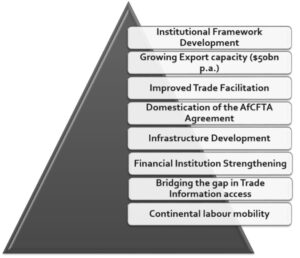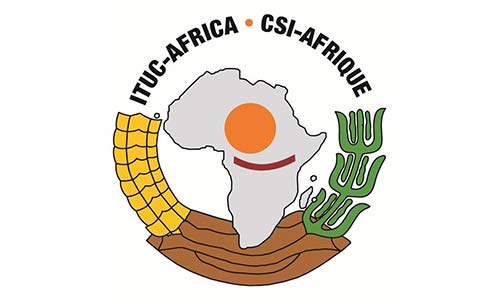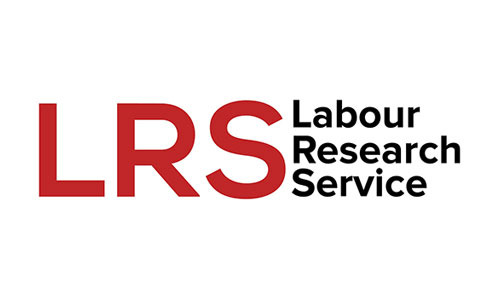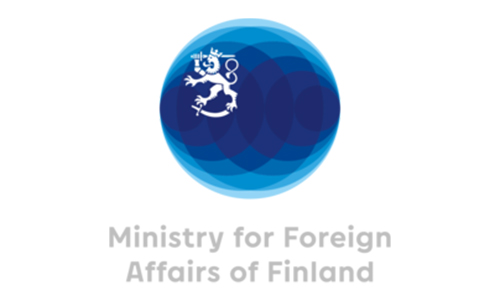On 7 July 2019, President Muhammadu Buhari signed the African Continental Free Trade Area Agreement (AfCFTA), formalising Nigeria as a party. After originally declining to sign the deal, the Nigerian President did so a few months later. The AfCFTA Federal Executive Council subsequently gave its approval on 11 November 2020, ratifying Nigeria’s membership.
To strategically position itself, Nigeria established the National Action Committee on the AfCFTA (the NAC). Nigeria’s objective is to become one of Africa’s preferred suppliers of value-added goods and services. The goal is to get at least 10% of Africa’s global imports in order to double Nigeria’s export revenue by 2035.
Nigeria’s National Action Committee (NAC) has outlined an eight-pillar strategy for Nigeria’s implementation of the AfCFTA. The eight-pillar strategy is illustrated in the image below:

The above strategy is in line with the African Union’s framework for boosting intra-African trade. Nigeria aims to achieve this by focusing on its competitive advantage in the following areas: a burgeoning population of over 200 million people, an abundance of minerals and forage crops, a thriving telecommunications and digital economy, and a growing entertainment sector.
There is a need for African leaders and governments to ensure that their countries are adequately prepared for the AfCFTA in order to reap its full benefits. To that end, there are some key areas of trade that would determine the success of the AfCFTA; this includes, but is not limited to, trade in goods, trade in services, intellectual property and digital trade. Nigeria has been preparing its institutions earnestly for these critical areas in a bid to ensure its successful participation in the AfCFTA. The following outlines some of the ways Nigeria has been preparing.
Trade in goods
Nigeria has undertaken training for government personnel in the following areas: rules of origin, import and export obligations of state parties, preparation and submission of CTD in accordance with worldwide best practices, as well as standards requirements and certification processes. In order to facilitate trade, on 30 May 2022 the federal government signed a concession agreement with the African Finance Corporation and China’s Huawei Technologies Ltd to accomplish this goal of fully automating customs operations. This concession covers both operational and administrative processes, such as human resource management, document management, and business continuity management systems. In addition, there is a plan in the works to strengthen port infrastructure by developing in-land dry ports and deep sea ports in critical locations throughout the country including Lagos, Delta and Calabar. There are also intentions to pass the Trade Remedies Bill into law and to establish the Trade Remedies Authority.
Trade in services
Nigeria plans to develop policies to guide services liberalisation under the AfCFTA in collaboration with government institutions such as the immigration authorities, the private sector and services professional bodies. There are also plans underway to create and strengthen an accreditation process for foreign professionals across various professional bodies. From the above plans, it appears as if Nigerian institutions are well on their way to implementing the AfCFTA when it concerns trade in goods and services; however, the common challenge plaguing these two areas is a lack of political will. While these plans have been put in place, progress toward some of the objectives listed above has been sluggish due to corruption, bureaucracy and nepotism.
Digital trade
Africa has seen a surge in investment in the technology sector over the last five years, particularly in e-commerce and financial services (falling under the digital trade in goods and services umbrella). In 2021 alone, African technology start-ups were able to raise a cumulative sum of USD four billion – USD 1.63 billion of which Nigerian start-ups raised. In furtherance of the opportunities digital trade presents under the AfCFTA, Nigerian institutions are also laying the proper groundwork for its success. Some of the ways Nigeria is preparing for this are highlighted below.
The National Information Technology Agency is pushing for the passage of the Electronic transactions bill to regulate e-commerce as well as the Nigerian Data Protection Bill. Several other plans to improve the digital infrastructure in Nigeria include deepening broadband penetration by the deployment of hybrid technologies and the development of industrial parks and technology zones. Nigeria has also passed the Nigerian Start-up Bill into law in order to support technological growth. There is no doubt that these plans are laudable, however, there are clear issues. For instance, the electronic transactions bill does not recognise any specific agency that will be responsible for its implementation, and there is a lack of adequate provision for alternative dispute settlement mechanisms under the bill suited to the peculiarities of digital trade. These two issues can be easily addressed by establishing an office under the Ministry of Trade, Industry and Investment that is authorised to implement the bill once passed into law. The government should also provide efficient alternative dispute resolution mechanisms, especially for international purchases (e.g. online dispute resolution).
Intellectual property
This is another crucial area for the success of the AfCFTA. Nigeria is currently planning to overhaul its intellectual property regime in order to meet global standards. Some of the challenges currently plaguing the intellectual property regime are a lack of coordination among the bodies that oversee intellectual property in Nigeria and a lack of effective enforcement procedures for piracy and counterfeiting.
In order to revamp the intellectual property regime, the government announced a draft national policy and strategic plan for intellectual property in Nigeria on 19 September 2022 with a strategy to reform the following Acts: the Copyrights, Trade Marks, Patents and Designs Act, amongst others. While the details of the draft policy document are not available to the public, it is hoped that these above-listed challenges would be addressed.
In conclusion, the AfCFTA holds great promise for Nigeria and the rest of Africa. If the necessary steps are implemented, Africa is well on its way to being the centre of economic interests globally.
References
Femi Olubanwo, Oluwatoba Oguntuase “Strengthening Intellectual Property Rights and Protection in Nigeria”
Francis Anatogu “Implementing the AfCFTA: The Journey so far”
National Information Technology Agency “Efforts for Inclusive E-commerce and Growth in Nigeria”
Nigerian Office for Trade Negotiations “A Hand book on the basic trading requirements for Nigerian Traders within the African Continental Free Trade Area”.
Oluyinka Onigbinde “Customs to begin full automation of processes by 2023”
Article source: TRALAC
Tunis declaration calls for the inclusion of labour provisions in the AfCFTA agreement




